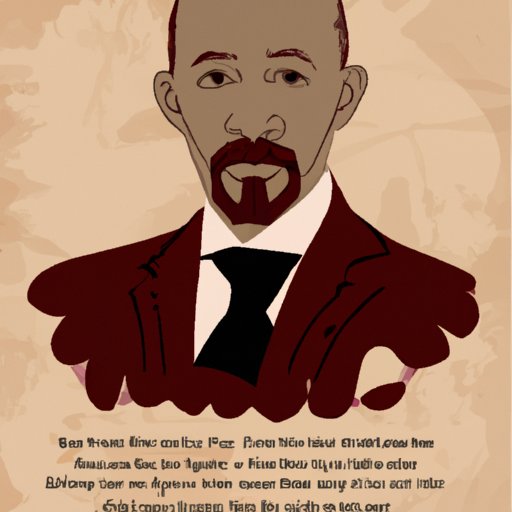Introduction: What is the Talented Tenth?
The concept of the Talented Tenth refers to the idea that one in ten African Americans should be educated and trained to serve as leaders within their communities. This concept was first articulated by W.E.B. Du Bois, an African American civil rights leader and scholar, in his groundbreaking 1903 essay, “The Talented Tenth.” The Talented Tenth has had a lasting impact on African American education, civil rights, and leadership. In this article, we will explore the concept of the Talented Tenth and examine its influence on African American history.
Examining W.E.B. Du Bois’ Concept of the Talented Tenth
In “The Talented Tenth,” Du Bois wrote that African Americans needed to develop a new kind of leadership that could help them rise above the oppression they were facing. He argued that the best way to do this was to educate and train a select group of African Americans who could then become leaders in their communities. He referred to this group as the “Talented Tenth,” and he envisioned them as being “the Negro race’s most gifted and promising individuals.”
Du Bois believed that educating and training the Talented Tenth was essential for the advancement of African Americans. He argued that these leaders would have the knowledge and skills necessary to lead their communities and fight for justice. He also argued that the Talented Tenth should use their education to help other African Americans improve their lives. He wrote, “The Negro race, like all other races, is going to be saved by its exceptional men…those men who can learn, think and discover, and who can inspire others with their vision and courage.”
Exploring the Impact of the Talented Tenth on African American Education
Du Bois’ concept of the Talented Tenth had a profound impact on African American education. Prior to Du Bois’ essay, there were limited educational opportunities available to African Americans. Most African Americans were denied access to higher education due to segregation and discrimination. However, Du Bois argued that educating and training the Talented Tenth was essential for the advancement of African Americans.
His argument helped to expand access to higher education for African Americans. He argued that providing educational opportunities to the Talented Tenth would create a ripple effect that would benefit the entire African American community. As more African Americans received an education, they could then go on to become teachers, lawyers, doctors, and other professionals who could help to improve their communities.
Analyzing the Role of the Talented Tenth in the Civil Rights Movement
The Talented Tenth played an important role in the civil rights movement. Many members of the Talented Tenth were involved in the struggle for racial justice. They included activists such as Martin Luther King Jr., Rosa Parks, and John Lewis. These individuals used their education and training to inspire and mobilize people to fight for civil rights.
The Talented Tenth also provided important leadership during the civil rights movement. They served as guides and mentors to the younger generations of activists. They provided support and guidance to those who were fighting for civil rights, and they helped to ensure that the movement remained focused on its goal of achieving racial justice.
A Historical Perspective on the Talented Tenth
The term “Talented Tenth” was first coined by W.E.B. Du Bois in his 1903 essay. However, the concept of the Talented Tenth has a longer history. It was inspired by the writings of 19th century philosopher and educator Alexander Crummell. Crummell argued that African Americans needed to develop a new kind of leadership if they wanted to achieve equality and freedom. He argued that African Americans should develop a class of educated leaders who could serve as examples for the rest of the African American community.

The Role of the Talented Tenth in the Black Community
The Talented Tenth has had a significant impact on the African American community. The Talented Tenth has served as a unifying force for African Americans. Its members have come from different backgrounds and have represented different points of view, but have all been united in their commitment to advance the cause of racial justice.
The Talented Tenth has also served as a powerful voice for the African American community. Their accomplishments and successes have helped to dispel negative stereotypes about African Americans and have raised the visibility of the African American experience.

How the Talented Tenth Shaped African American Leadership
The Talented Tenth has had a profound impact on African American leadership. The Talented Tenth has provided an example of what African American leadership can look like. Its members have shown that African American leaders can be intelligent, articulate, and passionate about their beliefs. They have also shown that African American leaders can be successful without compromising their values or sacrificing their integrity.
The Talented Tenth has also inspired future generations of African American leaders. Its members have served as role models and have shown that it is possible to achieve success through hard work, dedication, and perseverance.

Conclusion: Reflection on the Talented Tenth
The concept of the Talented Tenth has had a lasting impact on African American education, civil rights, and leadership. It has provided opportunities for African Americans to receive an education and has helped to expand access to higher education. It has also served as a unifying force for the African American community and has provided a powerful voice for African Americans. Finally, it has inspired future generations of African American leaders and has shown that it is possible to achieve success through hard work, dedication, and perseverance.
(Note: Is this article not meeting your expectations? Do you have knowledge or insights to share? Unlock new opportunities and expand your reach by joining our authors team. Click Registration to join us and share your expertise with our readers.)
